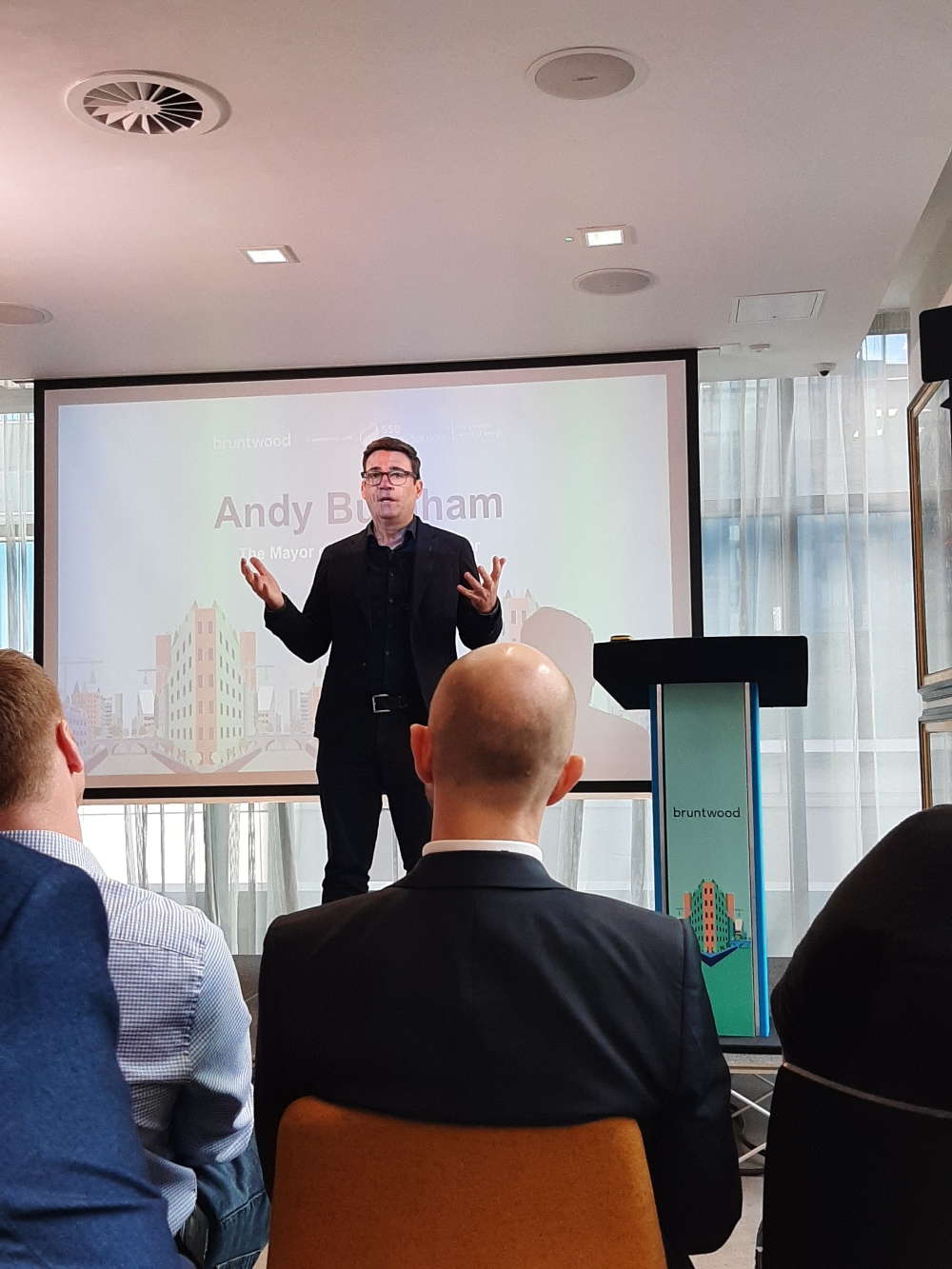On Thursday 13 October, Bruntwood hosted the second event in a series of fringe events leading up to the Greater Manchester Green Summit focusing on sustainable workplaces.
Now in its fifth year, The Greater Manchester Green Summit will take place on Monday 17 October at The Lowry, Salford Quays.
The summit offers a great opportunity for businesses, policymakers, innovators and local communities to network, collaborate and share ideas with like-minded people committed to accelerating change in our region.
As the headline sponsor, Bruntwood has staged a series of fringe events in partnership with SSE Energy Solutions to engage attendees and start important conversations surrounding key themes, like the future of work, ahead of the conference.
The way we work has changed dramatically in recent years, and as a consequence, so has the role of the workspace. Bruntwood’s fringe event “Future Workspaces: The Sustainability Challenge” discussed the sustainability challenges surrounding hybrid workplaces and the solutions that can help us to overcome them, creating workspaces of the future.
Mayor of Greater Manchester and GMLEP Board member Andy Burnham joined senior leaders from Bruntwood, SSE Energy Solutions, and Electricity North West to consider the role of the workspace and workers in sustainable futures.
Plus, Richard Rowlands, Managing Director of I Want Plants gave an insightful overview of the well-being benefits of biophilia in the workplace showcasing the benefits of living walls and nature-based retrofit solutions.
Andy Burnham discussed the importance of getting people back into office spaces as well as what Greater Manchester is doing to drive people back into the city centre.
Andy Burnham stated; “Myself and the ten leaders of gm took the decision to accelerate our changes to public transport like a cap on bus fares. We believe it’s right to help our residents in a cost-of-living crisis but also encourage them to go back to the office to relieve the pressures of things like energy bills at home.
“The problems of cities are identical wherever you are in the world, we’re all going through the same things. How do we help cities recover from the pandemic? How do we help them accelerate zero carbon? How do we make them more equal for residents?
“At a city level, it’s place first rather than party first. In GM we’re in a place to plot through turbulent times and plot the clearest course that we can to get where we’re going. And where we are going by 2038 is to a net zero city region. That is our goal and we believe that journey should be about making us greener but fairer as well. Lowering the cost of energy, lowering the cost of public transport, and bringing in new green jobs to create more prosperity. We will not be deflected, the turbulence makes it more important that we’re on course.”
Alex Edwards, Sustainability Director at Bruntwood gave an overview of the sustainability challenges in changing workplaces such as lower capacities and energy usage, he also discussed some of the solutions to overcome this such as creating flexible workspaces, the introduction of smart buildings that adapt energy use to occupancy and creating incentives to bring people into the office on quieter days.
Neil Kirkby, Managing Director of SSE Energy Solutions discussed the energy infrastructure needed to support people back to workplaces and the opportunities decarbonisation in the energy sector presents.
Neil Kirkby said, “With traumas you get opportunity. We are going through a green energy revolution and although there’s a lot of difficulty at the moment, there’s a lot of opportunity for new skills and jobs.
“We are at the perfect moment in time that as well as driving the economy to net zero we can also level up the economy. We have to train people. We can make greener fairer, and we have to, otherwise, we won’t get it, there isn’t the workforce.”
Finally, Jonny Sadler, Strategic Decarbonisation Manager, Electricity North West introduced the Bee Net Zero initiative and how it can help companies across Greater Manchester meet net-zero ambitions.
Jonny Sadler said, “We asked businesses what they need to get started on their journey and the top was more information and guidance about the practical action they can take. They want to take action but aren’t sure how. That’s where the Bee Net Zero partnership can support businesses.”
Bee Net Zero is a collaboration between GMCA, GMLEP, The Growth Company, GM Green City, Greater Manchester Chamber of Commerce, Green Economy, Manchester Climate Change Agency, Transport for Greater Manchester, Energy Innovation Agency, SME Climate Hub, Electricity North West and more.
Bee Net Zero takes a collaborative approach to helping businesses on their journey to becoming net zero with the overall aim of making Manchester the easiest place in the UK to become a net zero business.
It brings together networks, organisations and support programmes from across Greater Manchester to connect them with businesses, providing straightforward and cost-efficient solutions that can be put into action.
To learn more about Bee Net Zero visit the website.
To learn more about the Greater Manchester Green Summit on Monday 17 October, visit the website.

